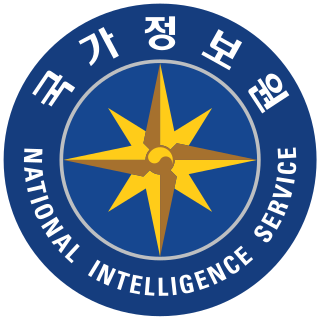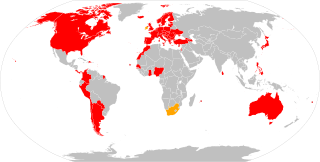Related Research Articles

Cybercrime encompasses a wide range of criminal activities that are carried out using digital devices and/or networks. These crimes involve the use of technology to commit fraud, identity theft, data breaches, computer viruses, scams, and expanded upon in other malicious acts. Cybercriminals exploit vulnerabilities in computer systems and networks to gain unauthorized access, steal sensitive information, disrupt services, and cause financial or reputational harm to individuals, organizations, and governments.
Cyberterrorism is the use of the Internet to conduct violent acts that result in, or threaten, the loss of life or significant bodily harm, in order to achieve political or ideological gains through threat or intimidation. Acts of deliberate, large-scale disruption of computer networks, especially of personal computers attached to the Internet by means of tools such as computer viruses, computer worms, phishing, malicious software, hardware methods, and programming scripts can all be forms of internet terrorism. Cyberterrorism is a controversial term. Some authors opt for a very narrow definition, relating to deployment by known terrorist organizations of disruption attacks against information systems for the primary purpose of creating alarm, panic, or physical disruption. Other authors prefer a broader definition, which includes cybercrime. Participating in a cyberattack affects the terror threat perception, even if it isn't done with a violent approach. By some definitions, it might be difficult to distinguish which instances of online activities are cyberterrorism or cybercrime.

The National Intelligence Service is the chief intelligence agency of South Korea. The agency was officially established in 1961 as the Korean Central Intelligence Agency, during the rule of general Park Chung Hee’s military Supreme Council for National Reconstruction, which displaced the Second Republic of Korea. The original duties of the KCIA were to supervise and coordinate both international and domestic intelligence activities and criminal investigations by all government intelligence agencies, including that of the military. The agency’s broad powers allowed it to actively intervene in politics. Agents undergo years of training and checks before they are officially inducted and receive their first assignments.
The Australian High Tech Crime Centre (AHTCC) are hosted by the Australian Federal Police (AFP) at their headquarters in Canberra. Under the auspices of the AFP, the AHTCC is party to the formal Joint Operating Arrangement established between the AFP, the Australian Security Intelligence Organisation and the Computer Network Vulnerability Team of the Australian Signals Directorate.

CyberBunker was an Internet service provider located in the Netherlands and Germany that, according to its website, "hosted services to any website except child pornography and anything related to terrorism". The company first operated in a former NATO bunker in Zeeland, and later in another former NATO bunker in Traben-Trarbach, Germany.
Brian Krebs is an American journalist and investigative reporter. He is best known for his coverage of profit-seeking cybercriminals. Krebs is the author of a daily blog, KrebsOnSecurity.com, covering computer security and cybercrime. From 1995 to 2009, Krebs was a reporter for The Washington Post and covered tech policy, privacy and computer security as well as authoring the Security Fix blog.

The Convention on Cybercrime, also known as the Budapest Convention on Cybercrime or the Budapest Convention, is the first international treaty seeking to address Internet and computer crime (cybercrime) by harmonizing national laws, improving investigative techniques, and increasing cooperation among nations. It was drawn up by the Council of Europe in Strasbourg, France, with the active participation of the Council of Europe's observer states Canada, Japan, the Philippines, South Africa and the United States.

Internet police is a generic term for police and government agencies, departments and other organizations in charge of policing the Internet in a number of countries. The major purposes of Internet police, depending on the state, are fighting cybercrime, as well as censorship and propaganda.
Organised crime in Nigeria includes activities by fraudsters, bandits, drug traffickers and racketeers, which have spread across Western Africa. Nigerian criminal gangs rose to prominence in the 1980s, owing much to the globalisation of the world's economies and the high level of lawlessness and corruption in the country.
Most Internet censorship in Thailand prior to the September 2006 military coup d'état was focused on blocking pornographic websites. The following years have seen a constant stream of sometimes violent protests, regional unrest, emergency decrees, a new cybercrimes law, and an updated Internal Security Act. Year by year Internet censorship has grown, with its focus shifting to lèse majesté, national security, and political issues. By 2010, estimates put the number of websites blocked at over 110,000. In December 2011, a dedicated government operation, the Cyber Security Operation Center, was opened. Between its opening and March 2014, the Center told ISPs to block 22,599 URLs.
CTRC may refer to:
There is no commonly agreed single definition of “cybercrime”. It refers to illegal internet-mediated activities that often take place in global electronic networks. Cybercrime is "international" or "transnational" – there are ‘no cyber-borders between countries'. International cybercrimes often challenge the effectiveness of domestic and international law, and law enforcement. Because existing laws in many countries are not tailored to deal with cybercrime, criminals increasingly conduct crimes on the Internet in order to take advantages of the less severe punishments or difficulties of being traced.

Internet censorship in South Korea is prevalent, and contains some unique elements such as the blocking of pro-North Korea websites, and to a lesser extent, Japanese websites, which led to it being categorized as "pervasive" in the conflict/security area by OpenNet Initiative. South Korea is also one of the few developed countries where pornography is largely illegal, with the exception of social media websites which are a common source of legal pornography in the country. Any and all material deemed "harmful" or subversive by the state is censored. The country also has a "cyber defamation law", which allow the police to crack down on comments deemed "hateful" without any reports from victims, with citizens being sentenced for such offenses.

The Cybercrime Prevention Act of 2012, officially recorded as Republic Act No. 10175, is a law in the Philippines that was approved on September 12, 2012. It aims to address legal issues concerning online interactions and the Internet in the Philippines. Among the cybercrime offenses included in the bill are cybersquatting, cybersex, child pornography, identity theft, illegal access to data and libel.
In 2013, there were two major sets of cyberattacks on South Korean targets attributed to elements within North Korea.

The Microsoft Digital Crimes Unit (DCU) is a Microsoft sponsored team of international legal and internet security experts employing the latest tools and technologies to stop or interfere with cybercrime and cyber threats. The Microsoft Digital Crimes Unit was assembled in 2008. In 2013, a Cybercrime center for the DCU was opened in Redmond, Washington. There are about 100 members of the DCU stationed just in Redmond, Washington at the original Cybercrime Center. Members of the DCU include lawyers, data scientists, investigators, forensic analysts, and engineers. The DCU has international offices located in major cities such as: Beijing, Berlin, Bogota, Delhi, Dublin, Hong Kong, Sydney, and Washington, D.C. The DCU's main focuses are child protection, copyright infringement and malware crimes. The DCU must work closely with law enforcement to ensure the perpetrators are punished to the full extent of the law. The DCU has taken down many major botnets such as the Citadel, Rustock, and Zeus. Around the world malware has cost users about $113 billion and the DCU's jobs is to shut them down in accordance with the law.

Carding is a term of the trafficking and unauthorized use of credit cards. The stolen credit cards or credit card numbers are then used to buy prepaid gift cards to cover up the tracks. Activities also encompass exploitation of personal data, and money laundering techniques. Modern carding sites have been described as full-service commercial entities.
The Reconnaissance General Bureau is a North Korean intelligence agency that manages the state's clandestine operations. Most of their operations have a specific focus on Japan, South Korea, and the United States. It was established in 2009.
Ghana has one of the highest rates of cybercrime in the world, ranking 7th in a 2008 Internet Crime Survey. The most popular form of cybercrime in Ghana is cyberfraud and is typically achieved via credit card fraud. However, recent decreases in universal credit card usage has seen the expansion of other cybercrimes such as blackmail and hacking. This growth in crime has warranted a government response, with policies specifically addressing the cyberspace being developed. This has necessitated various studies including a cyber security maturity study which was inaugurated by the Ministry of Communications and conducted by the Global Cyber Security Capacity Center (GCSCC) of the University of Oxford in collaboration with the World Bank.
Cybersex trafficking, live streaming sexual abuse, webcam sex tourism/abuse or ICTs -facilitated sexual exploitation is a cybercrime involving sex trafficking and the live streaming of coerced sexual acts and/or rape on webcam.
References
- 1 2 3 4 5 6 7 8 Junsik Jang, THE CURRENT SITUATION AND COUNTERMEASURES TO CYBERCRIME AND CYBER-TERROR IN THE REPUBLIC OF KOREA Archived 2013-06-07 at the Wayback Machine , RESOURCE MATERIAL SERIES No.79 139TH INTERNATIONAL TRAINING COURSE VISITING EXPERTS' PAPERS
- ↑ "Netan: history". Ctrc.go.kr. Archived from the original on 2013-02-18. Retrieved 2012-12-22.
- ↑ "Netan: target". Ctrc.go.kr. Archived from the original on 2013-02-19. Retrieved 2012-12-22.
- ↑ Myung Oh; James Larson (14 March 2011). Digital Development in Korea. Taylor & Francis. pp. 162–. ISBN 978-1-136-81313-9 . Retrieved 22 December 2012.
- ↑ Protalinski, Emil (2010-08-10). "South Korea sends in Cyber Terror police over Google Street View wifi data". The Next Web. Retrieved 2012-12-22.
- ↑ "S Korean police bring charges against Google for illegally collecting private info". News.xinhuanet.com. 2011-01-13. Archived from the original on January 17, 2011. Retrieved 2012-12-22.
- ↑ Police in South Korea Raid Google’s Office, New York Times, 2010/08/11/
- ↑ "Police to crack down on bomb info-sharing sites". The Korea Times. 2011-05-17. Retrieved 2012-12-22.
- ↑ "Korean gamblers targeted". The Korea Times. 2012-10-11. Retrieved 2012-12-22.
- ↑ ":: ISCR 2012 ::". Iscr.netan.go.kr. 2010-09-15. Archived from the original on 2013-02-19. Retrieved 2012-12-22.